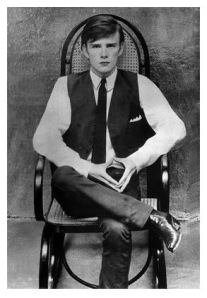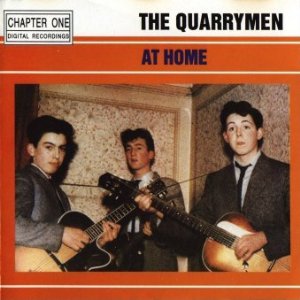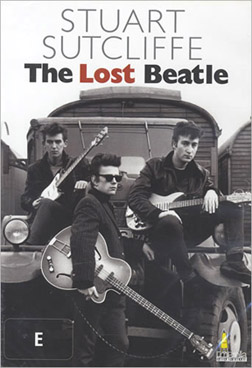Stuart Sutcliffe Young George Michael in Dance Again Video
past Liscio
Shy and withdrawn, inappreciably able to play a chord, so unsure of his ability he hid behind dark glasses and turned his back to the audience—if this is your portrait of Stuart Sutcliffe, y'all've got the incorrect rock bass guitarist.
 Stu has been described as gentle, fragile, a male child of beautiful heart. Only he was funny plenty to be on par with Lennon. He was an original thinker, highly intelligent, responsible and mature beyond his young years, "vulnerable on the surface merely extremely strong underneath". He was innovative (painting in Hamburg with metallic automobile paint and charcoal) and daring—fine art master Arthur Ballard remembered in the Beatles biography, Shout, that against higher rules, Stuart painted on massive canvasses and was a sartorial trendsetter even before Hamburg. Klaus Voorman said Stu could "run into 10 times more than other people"—he was "miles ahead of everybody", especially regarding the intensity of his life, his art, and his cut-border perception of style and imagery. An amazing contour for a kid barely out of his teens.
Stu has been described as gentle, fragile, a male child of beautiful heart. Only he was funny plenty to be on par with Lennon. He was an original thinker, highly intelligent, responsible and mature beyond his young years, "vulnerable on the surface merely extremely strong underneath". He was innovative (painting in Hamburg with metallic automobile paint and charcoal) and daring—fine art master Arthur Ballard remembered in the Beatles biography, Shout, that against higher rules, Stuart painted on massive canvasses and was a sartorial trendsetter even before Hamburg. Klaus Voorman said Stu could "run into 10 times more than other people"—he was "miles ahead of everybody", especially regarding the intensity of his life, his art, and his cut-border perception of style and imagery. An amazing contour for a kid barely out of his teens.
But could he play the guitar?
The contention that Stu was "a bad bass thespian" is a piece of historical hokum that has no substantiation– meaning no factual evidence backs it upwardly. Stuart had basically simply two detractors: the statements of one take been shown to be blatantly simulated—the remarks of the other are inconsistent and less than impartial. All the same years of media repetition from these 2 sources have been accepted equally truth.
Let's starting time at the end of 1959 when teenaged Lennon, McCartney and Harrison were actively searching for a bass guitarist. As is well known, they persuaded 19-year-old art student Sutcliffe to purchase a Hofner electric bass. George Harrison said it was "better to have a bass player that couldn't play than to non have a bass actor at all." (ane) Stuart straightaway recruited Dave May of the local Silhouettes to teach him Eddie Cochran's "C'mon Everybody".
 The Forthlin Road rehearsals at Paul'due south house, some of which were taped on Rod Murray's (Stu's flatmate) record recorder, took identify that March. In a 2007 article, Murray said, "Stu would borrow the recorder and go to Paul'due south firm to record…but he had to purchase his own tapes every bit they were so expensive." The audio quality is poor, but listening to these tapes makes clear that the entire band at this point was very rudimentary. (Note: Of the sixteen songs known to accept been recorded at the Forthlin Road rehearsals, three were released on 1995'south Anthology 1: "Cayenne", "Hallelujah" and "I Beloved Her So". Y'all tin can hear these on Youtube).
The Forthlin Road rehearsals at Paul'due south house, some of which were taped on Rod Murray's (Stu's flatmate) record recorder, took identify that March. In a 2007 article, Murray said, "Stu would borrow the recorder and go to Paul'due south firm to record…but he had to purchase his own tapes every bit they were so expensive." The audio quality is poor, but listening to these tapes makes clear that the entire band at this point was very rudimentary. (Note: Of the sixteen songs known to accept been recorded at the Forthlin Road rehearsals, three were released on 1995'south Anthology 1: "Cayenne", "Hallelujah" and "I Beloved Her So". Y'all tin can hear these on Youtube).
Finding gigs in Liverpool was tough and everybody was however going to school; not having played much together "for months", on May 10 the grouping found themselves earlier London musical scout Larry Parnes, who was looking for a group to back one of his stars, Baton Fury. Photos of this audition do show Stuart playing with his back turned, mayhap attempting to hide his fledgling ability. Paul McCartney said, "If anyone had been taking notice, they would have seen that when we were all in A, Stu would be in some other key. Simply he soon caught up and we passed that audition to go on tour." (2)
These photos are themerelyones of Stuart playing turned around—and this is where ane of the sources of the "bad bass playing" got its start.
The idea sprang from the lips of one Allan Williams, a colorful man of dubious veracity who chosen himself the Beatles manager when he was, in fact, a booking agent for diverse bands in Liverpool.
Pecker Harry, art school classmate of Sutcliffe and Lennon and creator of Mersey Crush mag, sets the record absolutely straight: "Allan Williams always comes out with the story that Stuart Sutcliffe played with his back to Larry Parnes at the Wyvern Society audition considering he couldn't play the bass, and that Parnes said he would take the group equally Billy Fury's backing group if they got rid of Stuart. This story first appeared in Williams' book, 'The Man Who Gave the Beatles Away'. Williams' accusation is untrue. Parnes himself was to say that he had no problem with Stuart, that his objection was to drummer Tommy Moore, who turned up late for the audition, was dressed differently than the other members and was a lot older than them. When we used to book the group for the fine art school dances there seemed to exist no problem with Stuart's performancdue east. In fact I never heard whatsoever criticism of Stuart as a musician until the publication of Williams' book (which came out in1977)." (3)
 Subsequently returning home from their tour, the ring played some xx-odd venues around Liverpool before Baronial 1960. At this fourth dimension, one of Liverpool's all-time, established groups was Derry and the Seniors. Seniors' Howie Casey remarked for the 'Beatles Anthology', "they were a nil little band." When he heard the Beatles were soon to play in Federal republic of germany, Casey complained, "They might destroy the [emerging German language rock] scene. I said transport a band like Rory Tempest or the Big Three. When they did turn upwardly, they were vastly improved…the improvement was like night and day."
Subsequently returning home from their tour, the ring played some xx-odd venues around Liverpool before Baronial 1960. At this fourth dimension, one of Liverpool's all-time, established groups was Derry and the Seniors. Seniors' Howie Casey remarked for the 'Beatles Anthology', "they were a nil little band." When he heard the Beatles were soon to play in Federal republic of germany, Casey complained, "They might destroy the [emerging German language rock] scene. I said transport a band like Rory Tempest or the Big Three. When they did turn upwardly, they were vastly improved…the improvement was like night and day."
Arriving in Hamburg, the Beatles (whose current playlist of songs could barely make full an hour) were shocked to learn they were expected to play close to eight hours well-nigh every dark. They had to expand their repertoire, and fast.
George: "We had to larn millions of songs. We'd be on for hours…Sabbatum would start at iii or four in the afternoon and proceed until 5 or six in the morning."
John: "We got meliorate and got more than confidence. We couldn't help information technology, with all the feel, playing all night long."
Paul: "We got better and ameliorate and other groups started coming to watch us."
Is information technology apparent to think that all this learning, experience, confidence and improvement affected every Beatle except Sutcliffe—the others were roaring along, simply Stu was withal just plunking? Stuart himself wrote home: "We accept improved a 1000-fold since our inflow."
These "savage young Beatles" were now playing loud, thrashing, primeval and pumping proto-punk rock—a throbbing nightly musical orgy. Lennon would say these Hamburg performances were the Beatles at their rock and curl best.
"Backbeat" manager Ian Softley, subsequently researching extensively and talking to bands and others who attended the German clubs, told the Los Angeles Times: "he (Stu) was very punk, very insistent. He would plough up his bass actually loud… information technology was dominant and driving."
Howie Casey said in the same Times piece that Stu "had a corking live style". He would know…while the recently-arrived Beatles were yet playing the Indra, Bruno Koschmider (owner of both clubs) wanted continual music at the Kaiserkeller. And then he split upward the Seniors and the Beatles–in effect, creating a third band. Says Casey, "I was given Stuart Sutcliffe along with Derry and Stan Foster and we had a High german drummer." If Stuart couldn't play, a professional like Casey certainly wouldn't have tolerated him very long. Casey never complained about Stu'southward power. And this temporary separate actually made Sutcliffe the offset Beatle to play the sought-after Kaiserkeller gig.
In 'The Beatles History', Rick Hardy of the Jets confirmed: "Stu never turned his back on stage. He certainly played to the audience and he certainly played bass. If y'all have someone who tin can't play the instrument properly, y'all have no bass sound. There were two rhythm guitarists with the Beatles and if one of them couldn't play, you wouldn't have noticed it—but it's different with a bass guitar. I was there and I can say quite definitely Stuart never did a show in which he wasn't facing the audience."
Renowned artist and bassist Klaus Voorman says, "Stu was a really good stone and roll bass role player, a very basic bass player, completely different. He was, at the time, my favorite bass actor…and he had that cool look." In a 2006 documentary, Voorman's opinion was, "The Beatles were best when Stuart was however in the band. To me it had more balls, information technology was even more rock and scroll when Stuart was playing the bass and Paul was playing piano or another guitar. The ring was, somehow, as a stone and roll band, more complete."
Interviewed on radio, Beatles drummer Pete Best revealed "what a expert bass thespian Stuart was." Pete has said, "I've read then many people putting him downwardly for his bass playing. I'd like to gear up that one straight. His bass playing was a lot ameliorate than people requite him credit for. He knew what his limits were…what he did was accept that and he gave 200%. He was the smallest Beatle with the biggest heart."
Stu, who had stayed in Hamburg later the others had gone back to Liverpool, received a letter from George that read in part: "Come home sooner, every bit if we go a new bass player for the time being, information technology will exist crumby as he will take to learn everything. It's no good with Paul playing bass, we'd decided, that is, if he had some kind of bass to play on!"
And not long before his death, after he'd left the Beatles, Stuart was asked to play with a German grouping, the Bats. He borrowed back his bass from Voorman (to whom he'd sold it), and played the Hamburg Fine art School Funfair and the Kaiserkeller. The "James Dean of Hamburg" was obviously respected for his bass work.
There is no record of anyone commenting negatively near Stuart's playing the entire time the Beatles were actually performing in Liverpool or in Hamburg…except for one. At terminal nosotros come to Stuart's other detractor: Paul McCartney.
Paul has knocked Stu's bass playing– remarks he fabricated while working with Stu were perhaps spawned past their "dead rivalry" (at least that's how Paul saw information technology), and are therefore open to question. But many of Paul's negative comments have been in retrospect. In 1964, much closer to when he'd actually been playing with Sutcliffe, Paul said in a Shell Instrumental interview: "Not that I'm suggesting that every bass histrion should larn on an ordinary guitar. Stuart Sutcliffe certainly didn't, and he was a groovy bass man."
Stuart was clear-eyed and candid about his musicianship. He put it all out there and made no apologies. He had the nerve to audition when he'd barely begun to play—that took guts. He worked hard and grew in expertise along with the rest of the band in Liverpool. Having to quickly master new textile in Germany, Stu could rely, if not on deep innate talent, then on his very loftier IQ to memorize the "millions" of new songs. Voorman gets the terminal word on the consequence: "It sounded astonishing, fantastic. I loved it from the first moment. The other bands that played in the clubs were skilful, but none were as expert as them."
By all reliable accounts, Sutcliffe'due south bass put downward a hard-driving, rock and scroll sound. It wasn't fancy…his attack was pretty basic. But when it came to playing raw, exciting, sex-drenched rock and roll that hit yous in the chest, electrified your limbs, made you want to dance all night and kept y'all coming back to the Superlative X Lodge for more, the band to see was Stuart Sutcliffe and The Beatles.
——
Sources:
(1) 'A Brief History of the Beatles' online
(2) 'The Beatles Bible' online
(three) 'The Beatles History' online
Note: Additional references for this commodity include:The Life of John LennonandShout past Philip Norman; quotes by Astrid Kirchherr for Boston ninety.9 WBUR andHow Stuff Works;Liddypool: Birthplace of the Beatlesby David Bedford;The Beatles in Hamburg by Hillman;Art by Lennon, McCartney, Sutcliffe and Starr; interviews by Garry James;British Youth Culture-Shapers of the fourscore'southward;The Quarrymen Through Rubber Soulpast Everett; Pete Best interview/terrascope;Komm, Gib Mir Deine Mittpast Knublauch, Korinth and Muller; Stuart Sutcliffe messages; Voorman/tripod.com Quotes; andJohn, Paul, George, Ringo and Stu-Los Angeles Times/Movies
—————-
Source: https://daytrippin.com/2011/06/22/stuart-sutcliffes-bass-playing-id-like-to-set-that-one-straight/
0 Response to "Stuart Sutcliffe Young George Michael in Dance Again Video"
Post a Comment